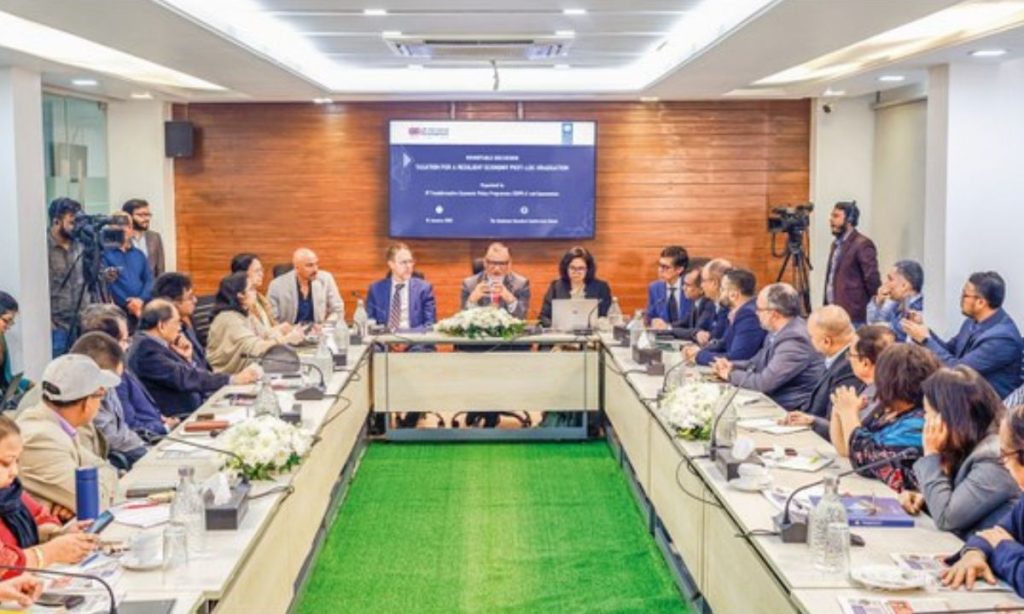Dhaka, 16 January 2025 – The United Nations Development Programme (UNDP) Bangladesh hosted a pivotal roundtable titled “Taxation for a Resilient Economy Post-LDC Graduation” on 15 January 2025 at The Business Standard conference room in Dhaka. The event brought together policymakers, industry leaders, and experts to deliberate on the critical role of equitable and sustainable tax policies in shaping Bangladesh’s economic future as it prepares to graduate from Least Developed Country (LDC) status in 2026.
For industries like garments, which contribute significantly to Bangladesh’s economy, the transition presents both challenges and opportunities. The discussion underscored the need for inclusive tax policies that support small and medium enterprises (SMEs), promote gender equity, and foster sustainable development.
Event Highlights: Taxation Policies and Economic Resilience
The roundtable focused on key themes such as reforming tax policies to ensure economic resilience, expanding the tax base, and addressing gender disparities in taxation. Participants emphasized the importance of creating a tax system that benefits a wider population, particularly women, who make up a significant portion of the workforce in industries like garments.

Private sector leaders played a crucial role in shaping the dialogue, highlighting the need for collaboration between the government, businesses, and international organizations to design policies that support sustainable growth. The discussion also addressed the challenges of aligning tax policies with macroeconomic goals, such as controlling inflation and increasing the tax-to-GDP ratio.
CEO Wasim Zakariah’s Participation: Advocating for the Garment Industry
As Co-chairman of the standing committee on SDG Affairs at BGMEA, Posh Garments’ CEO Wasim Zakariah actively contributed to the discussion. He shared insights on how the garment industry can align with sustainable taxation practices and support Bangladesh’s economic resilience post-LDC graduation.
Mr. Zakariah highlighted the challenges faced by exporters, such as the 1% source tax on the freight-on-board (FOB) price, which applies regardless of profitability. He also emphasized the need for policies that encourage local production of raw materials, such as fabrics and accessories, to meet the double transformation rules of origin after the loss of Generalized System of Preferences (GSP) benefits.
“The garment industry is a cornerstone of Bangladesh’s economy, employing millions, particularly women. To ensure sustainable growth, we need tax policies that support innovation, sustainability, and fair competition,” said Mr. Zakariah.
Posh Garments’ Commitment to SDGs and Sustainable Practices
Posh Garments has long been committed to advancing the Sustainable Development Goals (SDGs) through ethical business practices and sustainable initiatives. The company is actively working to reduce its environmental footprint, promote gender equality, and support the economic empowerment of women in the workforce.
As Bangladesh transitions from LDC status, Posh Garments is dedicated to aligning its operations with the principles of economic resilience and sustainability. This includes investing in renewable energy, reducing waste, and advocating for policies that support the growth of SMEs and women entrepreneurs.
Key Takeaways from the Roundtable
The roundtable concluded with actionable recommendations for building a resilient economy post-LDC graduation:
- Reform Tax Policies: Simplify the tax system, reduce unnecessary exemptions, and promote voluntary compliance through automation and transparency.
- Promote Gender Equity: Design gender-sensitive tax policies that support women entrepreneurs and workers in the informal sector.
- Support SMEs: Provide incentives and simplify regulatory compliance to help small businesses formalize and contribute to the tax base.
- Enhance Collaboration: Foster partnerships between the government, private sector, and international organizations to design and implement effective tax reforms.
Conclusion: Posh Garments’ Vision for the Future
Posh Garments remains steadfast in its commitment to sustainable growth and policy advocacy. As Bangladesh prepares for its post-LDC future, it will continue to champion initiatives promoting economic resilience, gender equity, and environmental sustainability.
The roundtable reminded us that the journey toward a resilient economy requires collective effort. Posh Garments calls on industry stakeholders to collaborate in shaping policies that ensure a fair and sustainable future for all.
Follow our blog and connect with us on social media to stay updated on Posh Garments’ leadership in sustainability and industry advocacy. Together, we can create a resilient and inclusive economy for Bangladesh.






